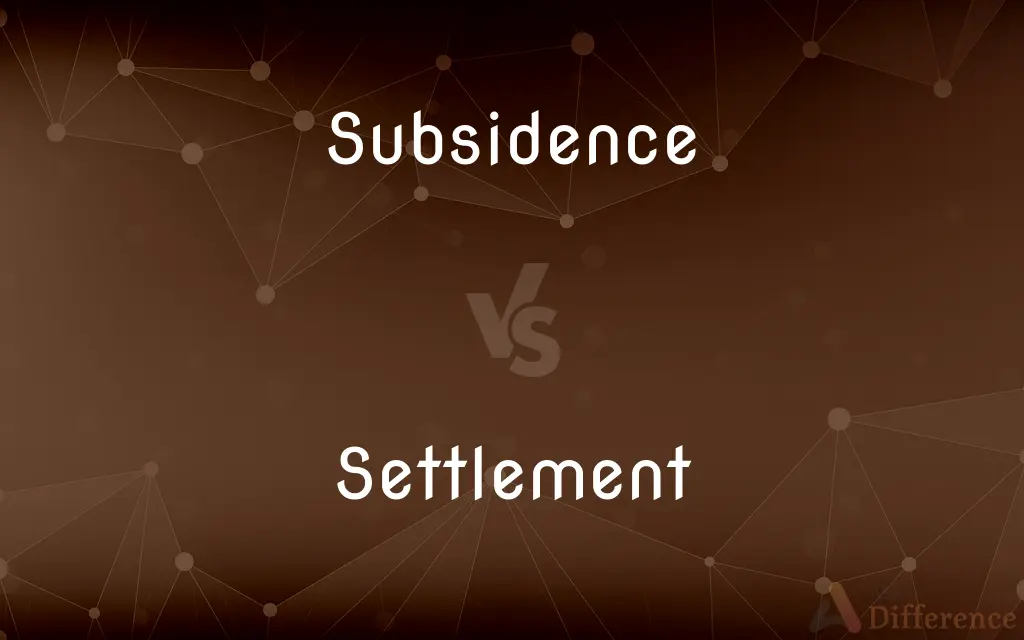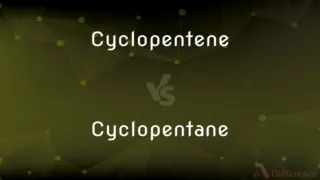Subsidence vs. Settlement — What's the Difference?
By Tayyaba Rehman & Fiza Rafique — Updated on March 8, 2024
Subsidence involves ground movement due to underground voids, while settlement refers to soil compression under structures.

Difference Between Subsidence and Settlement
Table of Contents
ADVERTISEMENT
Key Differences
Subsidence and settlement are both phenomena related to the movement of the Earth's surface, but they occur due to different reasons and have distinct impacts. Subsidence is usually the result of the ground collapsing or sinking due to the removal of underground support, such as the extraction of minerals or water. This can lead to uneven ground and can affect large areas. On the other hand, settlement is specifically related to the compression of soil layers due to the weight of structures built on top of them. It is a common consideration in construction and engineering, as it affects the stability and integrity of buildings and infrastructure.
Subsidence can be caused by natural processes such as the dissolution of limestone, which creates underground cavities that eventually collapse, or by human activities like mining and the excessive withdrawal of groundwater. This can lead to sudden and unpredictable ground movements, potentially causing damage to structures and land over a wide area. Settlement, however, is a more predictable process that occurs gradually as the weight of a new structure compresses the underlying soil, causing it to compact and settle. Engineers take settlement into account during the design phase to ensure structures can accommodate or resist these movements.
While subsidence can affect large swathes of land and multiple properties simultaneously, often leading to significant environmental and infrastructural issues, settlement is typically localized to the area immediately beneath a specific structure. As such, the effects of subsidence can be more widespread and challenging to manage, whereas settlement issues are usually addressed through engineering solutions specific to each construction project.
Subsidence often requires comprehensive management strategies, including monitoring, land-use planning, and sometimes engineering interventions to stabilize the ground, such as grouting or underpinning. In contrast, managing settlement involves careful site selection, soil testing, and designing foundations that can distribute the load of the structure evenly to minimize uneven settling.
Both subsidence and settlement can lead to property damage, but their management and mitigation strategies differ significantly. Subsidence may require large-scale interventions and long-term monitoring, especially in areas prone to this issue, while settlement is typically managed at the design and construction stages of individual buildings or infrastructure projects, with solutions tailored to the specific conditions of the site.
ADVERTISEMENT
Comparison Chart
Definition
The sinking or lowering of the ground surface due to various factors such as the removal of underground materials.
The downward movement of the ground under a structure due to soil compaction.
Causes
Natural processes (e.g., erosion), human activities (e.g., mining, groundwater extraction).
Weight of structures, soil compaction under load.
Impact Area
Can affect large areas and multiple properties.
Usually localized to the area under and immediately surrounding a structure.
Predictability
Often less predictable, can occur suddenly.
Generally predictable, considered in design and construction phases.
Management
Requires monitoring, land-use planning, sometimes large-scale engineering interventions.
Addressed through engineering solutions like proper foundation design and soil testing.
Compare with Definitions
Subsidence
Subsidence involves the downward movement of the Earth's surface, often over large areas.
The mining town experienced subsidence due to extensive coal extraction.
Settlement
Settlement refers to the natural sinking of soil under a structure's weight.
The new skyscraper's slight lean was due to differential settlement.
Subsidence
This phenomenon can cause structural damage and alter landscapes.
Subsidence led to numerous cracks in the roadways and buildings.
Settlement
Settlement can be uniform or differential, affecting structural integrity.
Differential settlement caused noticeable cracks along the house's foundation.
Subsidence
Subsidence can occur suddenly, posing risks to structures and residents.
A sudden subsidence event created a sinkhole in the middle of the neighborhood.
Settlement
It's a key factor in building and infrastructure design.
Engineers conducted soil tests to predict the settlement before constructing the bridge.
Subsidence
Managing subsidence often requires comprehensive monitoring and intervention.
The city implemented a subsidence monitoring program to prevent future infrastructure damage.
Settlement
Typically, settlement impacts are confined to the area beneath a structure.
The settlement was most pronounced directly under the building's heaviest section.
Subsidence
It can be triggered by natural processes or human activities, such as groundwater withdrawal.
The subsidence was attributed to the excessive pumping of groundwater for irrigation.
Settlement
Various techniques are used to minimize settlement effects.
The construction team used deep foundations to mitigate settlement risks.
Subsidence
Subsidence is a general term for downward vertical movement of the Earth's surface, which can be caused by both natural processes and human activities. Subsidence involves little or no horizontal movement, which distinguishes it from slope movement.Processes that lead to subsidence include dissolution of underlying carbonate rock by groundwater; gradual compaction of sediments; withdrawal of fluid lava from beneath a solidified crust of rock; mining; pumping of subsurface fluids, such as groundwater or petroleum; or warping of the Earth's crust by tectonic forces.
Settlement
The act or process of settling
The settlement of sediment.
Subsidence
To become less intense, active, or severe; abate.
Settlement
The settling or establishment of a person or a group of people, as in a new region or in a business.
Subsidence
To become smaller or less prominent, as swelling.
Settlement
A newly colonized region.
Subsidence
To move or sink to a lower or normal level
The earth subsided as the aquifer drained away.
Settlement
A small community.
Subsidence
To sink to the bottom, as a sediment.
Settlement
An arrangement or agreement reached, as in business proceedings or negotiating a dispute
A wage settlement.
A peace settlement.
Subsidence
To sit down slowly; settle down
"She looked swiftly around, and once she saw her husband, subsided primly onto the edge of a chair" (Jane Stevenson).
Settlement
The resolution of a lawsuit or dispute by settling.
Subsidence
The process of becoming less active or severe.
Settlement
The process of reaching such an arrangement, agreement, or resolution.
Subsidence
(geology) A sinking of something to a lower level, especially of part of the surface of the Earth due to underground excavation, seismic activity or underground or ground water depletion.
Settlement
The legal determination of title to property.
Subsidence
The act or process of subsiding.
The subdual or subsidence of the more violent passions.
Settlement
The process of making the determinations and distributions associated with a trust.
Subsidence
An abatement in intensity or degree (as in the manifestations of a disease);
His cancer is in remission
Settlement
A center providing community services in an underprivileged area. Also called settlement house.
Subsidence
A gradual sinking to a lower level
Settlement
The act of settling.
Settlement of debt
Subsidence
The sudden collapse of something into a hollow beneath it
Settlement
The state of being settled.
Settlement
A colony that is newly established; a place or region newly settled (even in past times).
Settlement
A community of people living together, such as a hamlet, village, town, or city; a populated place.
Settlement
(archeology) A site where people used to live together in ancient times; an ancient simple kind of village.
Settlement
(architecture) The gradual sinking of a building. Fractures or dislocations caused by settlement.
Settlement
(finance) The delivery of goods by the seller and payment for them by the buyer, under a previously agreed trade or transaction or contract entered into.
Settlement
(legal) A disposition of property, or the act of granting it.
Settlement
(legal) A settled place of abode; residence; a right growing out of legal residence.
Settlement
(legal) A resolution of a dispute.
Settlement
(law) A mutual agreement to end a dispute without resorting to legal proceedings, also known as an out-of-court settlement or settling out of court.
Settlement
The act of setting, or the state of being settled.
Settlement
Establishment in life, in business, condition, etc.; ordination or installation as pastor.
Every man living has a design in his head upon wealth power, or settlement in the world.
Settlement
That which settles, or is settled, established, or fixed.
Settlement
The act of peopling, or state of being peopled; act of planting, as a colony; colonization; occupation by settlers; as, the settlement of a new country.
Settlement
Matter that subsides; settlings; sediment; lees; dregs.
Fuller's earth left a thick settlement.
Settlement
The gradual sinking of a building, whether by the yielding of the ground under the foundation, or by the compression of the joints or the material.
Settlement
The act or process of adjusting or determining; composure of doubts or differences; pacification; liquidation of accounts; arrangement; adjustment; as, settlement of a controversy, of accounts, etc.
Settlement
A colony newly established; a place or region newly settled; as, settlement in the West.
Settlement
A settled place of abode; residence; a right growing out of residence; legal residence or establishment of a person in a particular parish or town, which entitles him to maintenance if a pauper, and subjects the parish or town to his support.
Settlement
Bestowal, or giving possession, under legal sanction; the act of giving or conferring anything in a formal and permanent manner.
My flocks, my fields, my woods, my pastures take,With settlement as good as law can make.
Settlement
That which is bestowed formally and permanently; the sum secured to a person; especially, a jointure made to a woman at her marriage; also, in the United States, a sum of money or other property formerly granted to a pastor in additional to his salary.
Settlement
A disposition of property for the benefit of some person or persons, usually through the medium of trustees, and for the benefit of a wife, children, or other relatives; jointure granted to a wife, or the act of granting it.
Settlement
A body of people who settle far from home but maintain ties with their homeland; inhabitants remain nationals of their home state but are not literally under the home state's system of government
Settlement
A community of people smaller than a town
Settlement
A conclusive resolution of a matter and disposition of it
Settlement
The act of colonizing; the establishment of colonies;
The British colonization of America
Settlement
Something settled or resolved; the outcome of decision making;
The finally reached a settlement with the union
They never did achieve a final resolution of their differences
He needed to grieve before he could achieve a sense of closure
Settlement
An area where a group of families live together
Settlement
Termination of a business operation by using its assets to discharge its liabilities
Common Curiosities
What is differential settlement?
Differential settlement occurs when different parts of a structure settle at different rates, potentially causing structural damage.
How can subsidence affect buildings?
Subsidence can lead to uneven ground, causing structural damage, cracks in foundations, and misalignment of doors and windows.
What is subsidence?
Subsidence is the sinking or lowering of the ground surface, often due to the removal of underground materials or natural processes.
What causes settlement?
Settlement is caused by the compression of soil layers under the weight of structures, leading to a downward movement of the ground.
Can subsidence be prevented?
While it's challenging to prevent natural subsidence, human-induced subsidence can be mitigated by managing groundwater extraction and minimizing activities that remove underground support.
How do engineers deal with settlement during construction?
Engineers conduct soil tests, choose appropriate foundation types, and design structures to distribute loads evenly to minimize settlement.
Is subsidence a slow process?
Subsidence can be slow or rapid, depending on the underlying cause and conditions.
What role does soil type play in subsidence and settlement?
Soil type significantly influences both phenomena; certain soils, like clay, are more susceptible to changes that can lead to subsidence and settlement.
Are there insurance policies that cover subsidence damage?
Yes, some insurance policies cover subsidence damage, but coverage details can vary widely.
Can subsidence lead to sinkholes?
Yes, subsidence caused by the dissolution of underground materials like limestone can lead to the formation of sinkholes.
What are some signs of settlement in buildings?
Signs include cracks in walls or foundations, uneven floors, and doors or windows that no longer fit properly.
What is soil consolidation in the context of settlement?
Soil consolidation refers to the process of soil compaction and water expulsion due to the weight of overlying structures, contributing to settlement.
Can landscaping cause subsidence?
In some cases, changes in landscaping that alter water drainage patterns can contribute to subsidence.
How does vegetation affect subsidence?
Vegetation, particularly trees, can contribute to subsidence by removing large amounts of water from the soil, causing it to contract.
What are some long-term effects of settlement on infrastructure?
Long-term effects can include ongoing maintenance challenges, reduced structural integrity, and the potential need for significant repairs or rebuilding.
Share Your Discovery

Previous Comparison
Cyclopentene vs. Cyclopentane
Next Comparison
Acquisition vs. BuyoutAuthor Spotlight
Written by
Tayyaba RehmanTayyaba Rehman is a distinguished writer, currently serving as a primary contributor to askdifference.com. As a researcher in semantics and etymology, Tayyaba's passion for the complexity of languages and their distinctions has found a perfect home on the platform. Tayyaba delves into the intricacies of language, distinguishing between commonly confused words and phrases, thereby providing clarity for readers worldwide.
Co-written by
Fiza RafiqueFiza Rafique is a skilled content writer at AskDifference.com, where she meticulously refines and enhances written pieces. Drawing from her vast editorial expertise, Fiza ensures clarity, accuracy, and precision in every article. Passionate about language, she continually seeks to elevate the quality of content for readers worldwide.














































